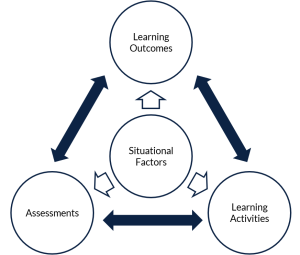Course Design
Course design is the process of planning for successful student achievement of intended learning outcomes and selection of instructional and assessment strategies in consideration of situational factors, e.g., course context and learner characteristics.
Your governing values (reflected in your teaching philosophy and positionality) are also important to account for as you make decisions about the overarching goal(s) for your students, essential questions around which to center learning, and ways in which you guide and support students in answering them. For example, a commitment to decolonizing and Indigenizing your course could be reflected in a learning outcome, the types of instructional strategies you choose, the way you design assignments, and how you center the voices of Indigenous scholars and knowledge holders.
For support with Indigenization, register for the CTLT Indigenous Initiatives Design Series and read the BC Campus Guide: Pulling Together for Curriculum Developers, specifically sections 2 and 4 that focus on design. CTL Educational Consultant for Indigenous Initiatives, Jessica Bayer, can also provide you with guidance.

Constructive Alignment of Learning Objectives, Assessments and Learning Activities. They are all influenced by situational factors.
Context
Considering the factors impacting the teaching/learning context can help identify and inform course design decisions.
Learning Outcomes
Learning outcomes represent what is formally assessed and accredited to the student. They offer a starting point for course design.
Assessment
Assessment has two main purposes: assessment for student learning (which is ongoing or formative) and evaluation of student achievement
Instructional Strategies
Instructional strategies are techniques teachers use to help students become independent, strategic learners.
Course Syllabus
The syllabus is where you can outline your plan for the course and how you will make the course fair, equitable and inclusive.
UBC’s Curriculum MAP is a tool to support course design and curriculum mapping using the principles of constructive alignment in a step-by-step process. Faculty are able to map course learning outcomes to Program Learning Outcomes, Ministry Standards and UBC Strategic Priorities. The tool also has a Syllabus Generator feature which follows Senate guidelines.
The Student Course Time Estimator tool is a planning tool that helps instructors and course designers estimate the expected student time commitment in a course based on the assigned learning activities. If you require assistance with this tool, please contact ctl.helpdesk@ubc.ca.
The AIM Program has Canvas courses on academic integrity available for faculty to assign to students in their classes for credit. Once a student completes an AIM course, they are awarded a Certificate of Completion.